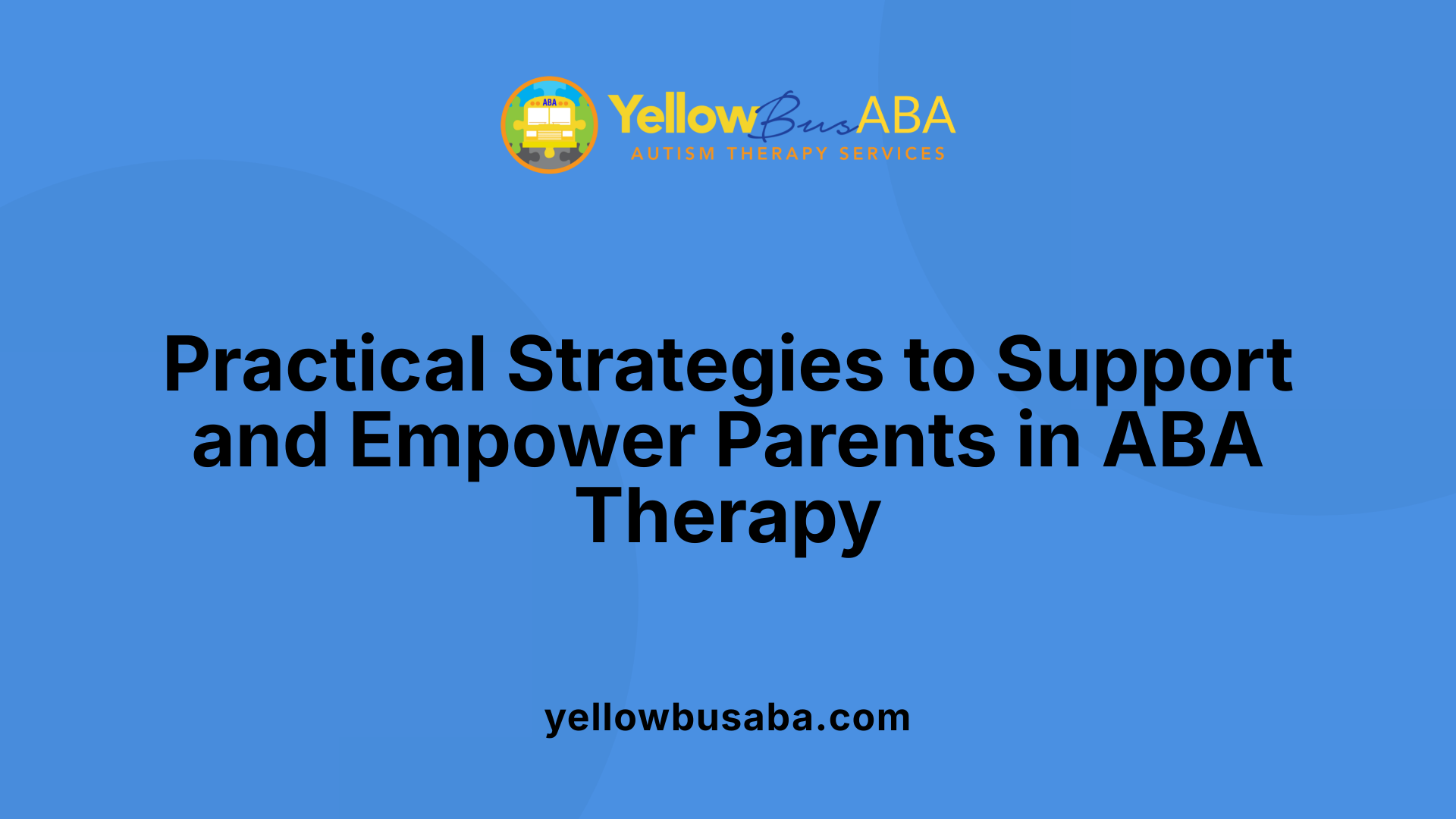The Critical Role of Parents in ABA Therapy Success
Applied Behavior Analysis (ABA) therapy is widely recognized as an effective intervention for individuals with autism spectrum disorder (ASD). Central to its success is the active involvement of parents, whose engagement can significantly accelerate therapeutic outcomes and enhance the generalizability of skills learned. This article explores the multifaceted benefits of parental involvement in ABA therapy, the challenges families face, and strategies to empower parents as vital partners in their child's treatment journey.
Understanding ABA Therapy and Its Goals

What is ABA therapy?
Applied Behavior Analysis (ABA) therapy is a science-based treatment that uses techniques like positive reinforcement and behavior modification to support individuals with autism. It helps develop essential skills such as communication, social interaction, self-care, and academic abilities. By analyzing the factors that trigger behaviors and their consequences, ABA promotes meaningful learning tailored to each person's unique needs. This therapy can be implemented in various settings like home, school, and community environments, often involving caregivers and trained specialists.
Goals and outcomes of ABA therapy
The main goals of ABA therapy include improving expressive and receptive language skills, enhancing social interactions, and increasing functional daily living skills. The therapy aims to reduce challenging behaviors by reinforcing positive actions. Individualized treatment plans focus on fostering independence and adapting learned skills across different environments. Continuous assessment and data tracking ensure the therapy remains effective and aligned with the individual's progress.
Role of professionals in ABA therapy
ABA therapy is usually provided by licensed behavior analysts known as Board Certified Behavior Analysts (BCBAs). These professionals have completed specialized graduate-level training, supervised practical experience, and certification exams to ensure high-quality care. BCBAs supervise therapists and technicians who work directly with clients. Licensing requirements vary by region but maintain the standards for competent and evidence-based ABA therapy delivery.
Why Parental Involvement is the Cornerstone of ABA Therapy

How does parental involvement impact therapy outcomes in ABA therapy for children with ASD?
Parental involvement plays a crucial role in the success of ABA (Applied Behavior Analysis) therapy for children with autism spectrum disorder (ASD). Research shows that including parents in treatment leads to better therapy outcomes by increasing the consistency and intensity of interventions across different environments. Children often make accelerated progress when their parents are actively engaged, benefiting from improved communication skills and developmental growth. Moreover, involving parents helps generalize the skills learned during therapy to everyday life, making interventions more effective and long-lasting.
What are the benefits of involving parents in ABA therapy?
Engaging parents in ABA therapy offers multiple benefits for both the child and the family. Parents become empowered decision-makers who support the implementation of intervention strategies, resulting in stronger parent-child relationships and reduced ASD symptoms. Parental involvement enhances communication skills in children and supports faster developmental progress. It also provides emotional benefits by fostering collaboration and open communication between families and professionals, ultimately creating a more supportive therapeutic environment.
What forms of parental involvement exist in ABA therapy?
Parents contribute to ABA therapy through various tailored approaches that suit their family’s needs. These include:
- Parent training: Educating parents in ABA principles to increase their skills and knowledge.
- Caregiver-guided sessions: Parents conduct therapy activities with professional coaching.
- Collaborative goal-setting: Families and therapists work together to define therapy objectives.
- Home-based therapy: Parents implement ABA techniques in daily routines for consistency.
Effective strategies for involvement involve attending training, observing professional sessions, maintaining open communication, and applying ABA methods consistently at home. This flexible involvement model ensures parents are integral to the therapy process, enhancing overall outcomes for children with ASD.
Challenges Faced by Parents Engaging in ABA Therapy

What Logistical and Financial Challenges Do Parents Face?
Parents of children undergoing ABA therapy often encounter significant logistical hurdles. Time constraints are a primary issue, as therapy sessions and training require substantial time commitments that can be difficult to balance with work and personal responsibilities. Financial demands also impose pressure, as ABA therapy may involve considerable costs, including paying for sessions, travel, and additional resources necessary for effective treatment.
How Does Emotional Stress Impact Parental Involvement?
Emotional costs, such as stress and burnout, frequently affect parents involved in ABA therapy. The emotional labor of managing therapy schedules alongside caring for a child with ASD can lead to exhaustion. Elevated levels of stress negatively impact parents’ well-being, which may, in turn, affect their ability to participate consistently and confidently in therapy-related activities.
What Systematic Barriers Limit Access to ABA Services?
Systematic challenges are another obstacle to effective parental involvement. Many families experience difficulties in accessing quality ABA services due to factors such as geographic location, limited availability of trained professionals, and complex healthcare systems. These barriers can delay intervention, reduce therapy intensity, and place additional strain on families striving to support their children’s progress.
Comprehensively addressing these challenges by offering support such as flexible scheduling, financial assistance, emotional counseling, and streamlined access to services is essential to enhance parental involvement and therapy outcomes.
Strategies to Empower Parents and Enhance ABA Effectiveness

Parent training programs
Training parents in Applied Behavior Analysis (ABA) principles equips them with the skills needed to implement therapy strategies consistently at home. Structured parent training improves their knowledge and confidence, leading to measurable gains in children's developmental progress and communication abilities. Techniques taught include behavior management, reinforcement tactics, and data collection.
Collaborative goal-setting and communication
Active collaboration between parents and ABA professionals fosters shared decision-making and tailored intervention plans. Open communication channels enable parents to contribute insights about their child’s needs and preferences, helping to align therapy goals with family values. Regular discussions and feedback help maintain consistency across therapy sessions and home environments.
Home-based interventions and coaching
Delivering ABA therapy in the home setting allows parents to practice and apply techniques in real-life contexts. Clinicians often provide in-home coaching, modeling strategies, and observational guidance. This hands-on support enhances parents’ ability to carry out interventions effectively, increasing intervention dosage and the generalization of learned skills.
Supporting parental well-being
Recognizing the emotional and logistical challenges parents face, including stress and burnout, is essential. Comprehensive support includes offering flexible scheduling, financial resources, and emotional support services. Addressing parental well-being increases their capacity to participate actively and sustain involvement in therapy, thereby improving outcomes for children.
These strategies collectively empower parents, ensuring their vital role in ABA therapy is supported and strengthened, which is crucial for optimizing treatment success.
Clinical and Research Insights on Parent-Implemented ABA
How effective is parent-implemented ABA therapy?
Parent-implemented ABA therapy has been shown to significantly improve outcomes for children with autism spectrum disorder (ASD). Research indicates that when parents are trained to apply ABA strategies at home, children's developmental progress, particularly in communication skills, accelerates. While professional-led interventions might achieve slightly better outcomes, parent-implemented ABA remains highly beneficial, especially when therapy intensity is matched to that of professional sessions.
What evidence supports improvements in communication for children?
Multiple studies, including pre-post designs and control group comparisons, demonstrate that children receiving parent-implemented ABA exhibit notable increases in communication and language skills. One pivotal study by Peters-Scheffer et al. (2011) confirmed these benefits, showing gains are often maintained years after intervention. This consistency is attributed to the increased opportunities for intervention children experience with active parental involvement.
Why is early intervention important in parent-led ABA?
Early commencement of ABA therapy correlates with better developmental outcomes. Training parents early equips them with the knowledge and skills to implement strategies effectively throughout daily routines, allowing children to generalize skills across environments—an essential factor for sustained progress in ASD treatments.
How can parents be better supported to reduce stress and improve therapy outcomes?
Parental stress and depression can hinder therapy effectiveness. Therefore, comprehensive support systems are critical. This includes providing accessible training, emotional support, coaching, and reducing logistical burdens such as time and financial constraints. Clinicians are encouraged to engage parents through collaborative goal-setting, in-home coaching, and open communication to foster empowerment and sustain involvement, ultimately leading to improved outcomes for both children and their families.
A Partnership for Rapid, Lasting Progress
The most transformative ABA therapy outcomes emerge when parents actively participate as integral members of the treatment team. Parental involvement not only facilitates consistent application of intervention strategies across environments but also accelerates the acquisition and generalization of critical skills. Despite challenges such as time constraints and emotional stress, comprehensive support—through training, coaching, and emotional resources—enables parents to engage effectively and sustain progress. Clinicians and therapy providers play a pivotal role in fostering this partnership, ensuring families feel empowered and equipped. Ultimately, when parents lean in with commitment and collaboration, children with autism experience the fastest and most meaningful transformations, unlocking their potential and enhancing family well-being.
References
- Parental Involvement in Applied Behaviour Analysis (ABA) ...
- The Importance of Parental Involvement in ABA Therapy
- Parents' Involvement in ASD Treatment: What Is Their Role?
- Critical Review of Applied Behavioral Analysis and Parental ...
- How to Become an Applied Behavior Analyst (ABA) Therapist
- How to Become an Applied Behavior Analyst in Texas
- How to Become an ABA Therapist - School of Education
- The effectiveness of applied behavior analysis program ...
- Applied Behavior Analysis (ABA)
- The Controversy Around ABA






